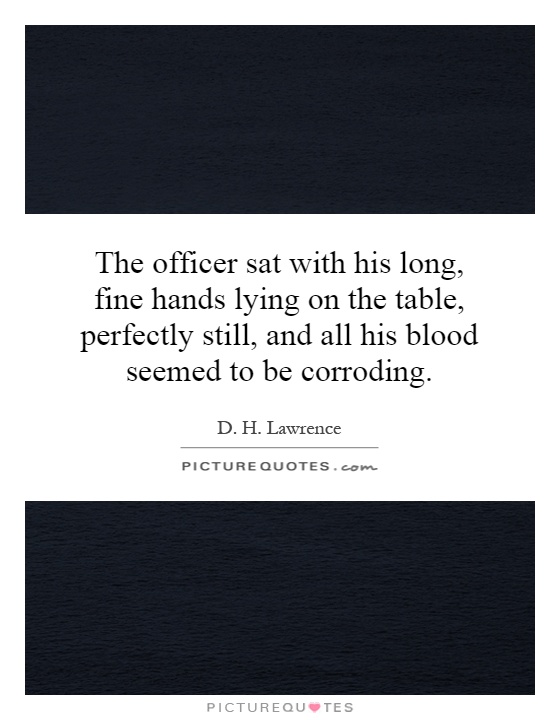The officer sat with his long, fine hands lying on the table, perfectly still, and all his blood seemed to be corroding

The officer sat with his long, fine hands lying on the table, perfectly still, and all his blood seemed to be corroding
In D.H. Lawrence's works, the theme of inner turmoil and emotional conflict is often explored through the characters he creates. The quote "The officer sat with his long, fine hands lying on the table, perfectly still, and all his blood seemed to be corroding" is a powerful example of Lawrence's ability to convey the inner struggles of his characters through vivid imagery.The image of the officer sitting with his hands lying on the table, perfectly still, suggests a sense of paralysis or stagnation. The stillness of his hands could symbolize a lack of action or movement, as if he is trapped in a state of emotional inertia. This sense of immobility is further emphasized by the description of his blood seeming to be corroding. The word "corroding" implies a slow, destructive process, as if something within him is eating away at his very essence.
Lawrence often explores the destructive effects of repressed emotions and inner turmoil on his characters. In this case, the officer's hands lying still on the table could represent his inability to express or release his emotions. The corrosion of his blood could symbolize the toxic effects of this emotional repression, as his inner turmoil eats away at him from the inside.
The use of the word "corroding" also suggests a sense of decay or deterioration. This could indicate that the officer's emotional conflict is not only causing him pain, but also slowly eroding his sense of self. As his blood corrodes, he may be losing touch with his own identity and sense of purpose.
Overall, this quote captures the intense emotional turmoil that Lawrence's characters often experience. Through the vivid imagery of the officer's still hands and corroding blood, Lawrence conveys a sense of inner conflict and decay that is both haunting and powerful.












 Friendship Quotes
Friendship Quotes Love Quotes
Love Quotes Life Quotes
Life Quotes Funny Quotes
Funny Quotes Motivational Quotes
Motivational Quotes Inspirational Quotes
Inspirational Quotes